Unit 10 I'd like some noodles-Section B 2a-2c 课件 (共30张PPT)
文档属性
| 名称 | Unit 10 I'd like some noodles-Section B 2a-2c 课件 (共30张PPT) | 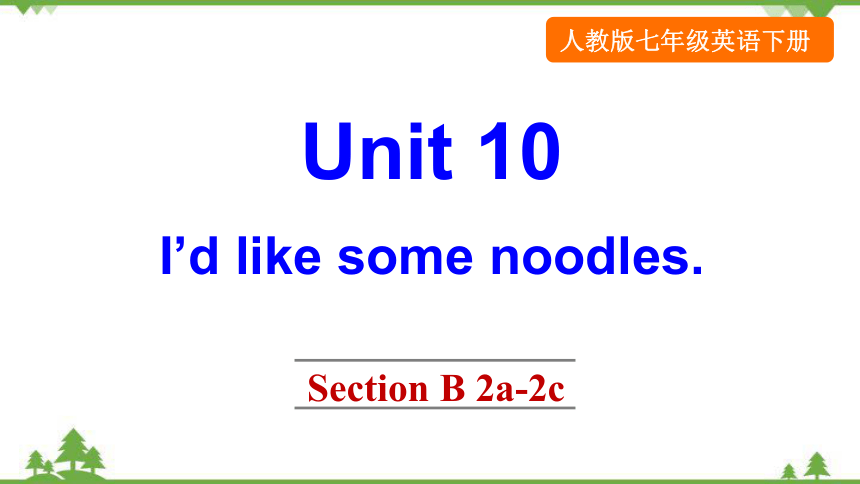 | |
| 格式 | ppt | ||
| 文件大小 | 2.5MB | ||
| 资源类型 | 教案 | ||
| 版本资源 | 人教新目标(Go for it)版 | ||
| 科目 | 英语 | ||
| 更新时间 | 2022-05-13 20:48:07 | ||
图片预览

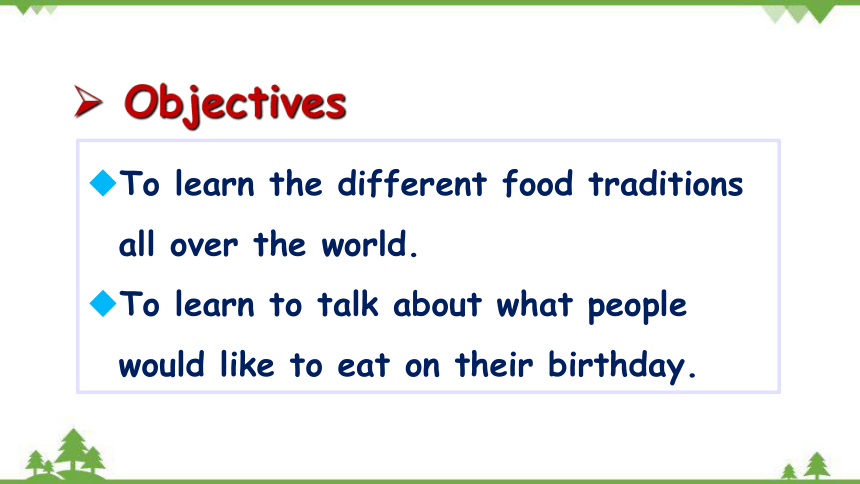
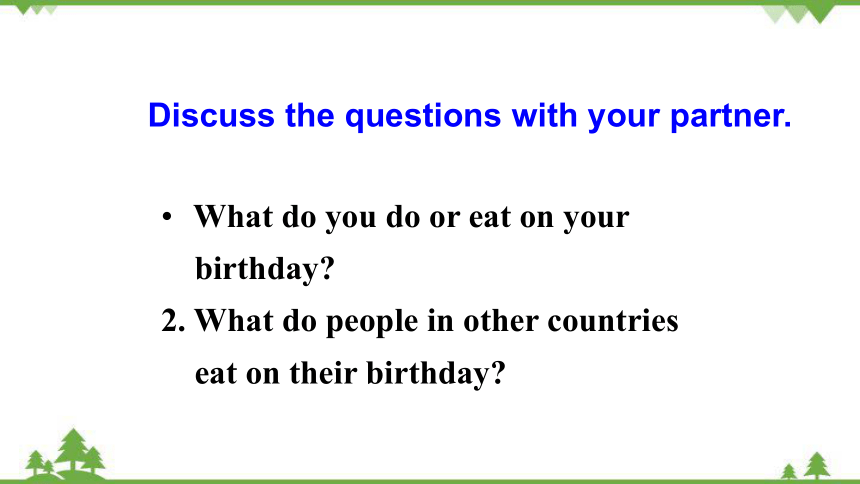
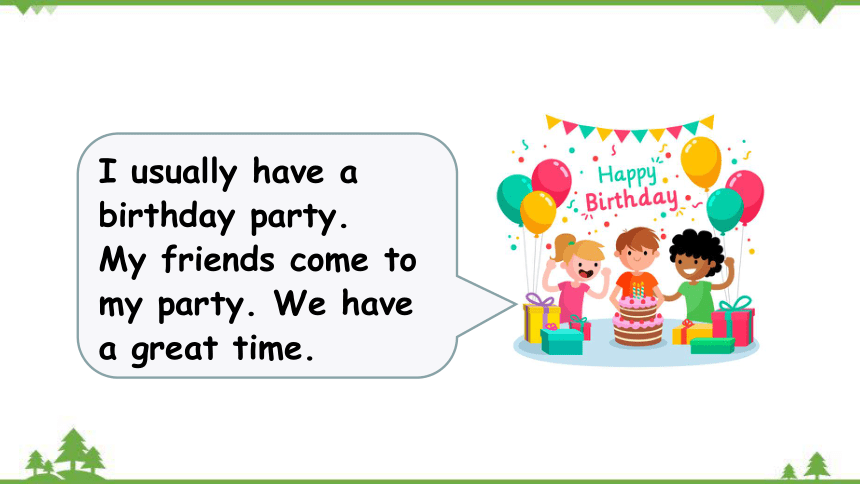
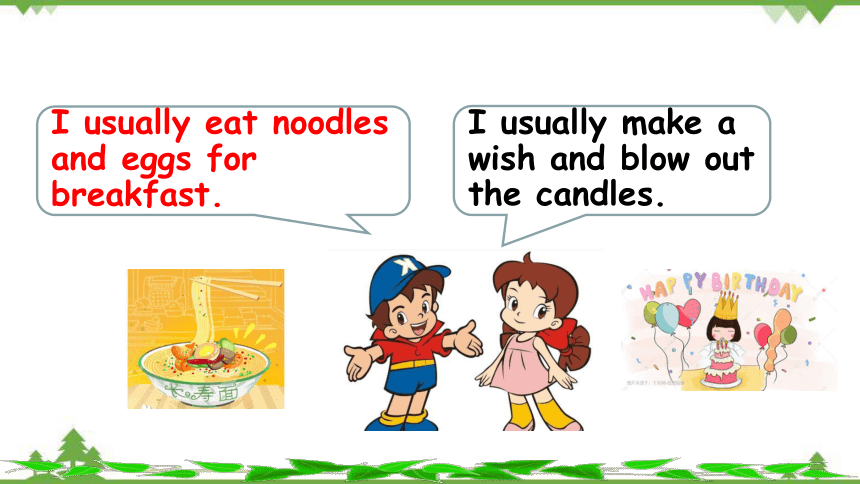
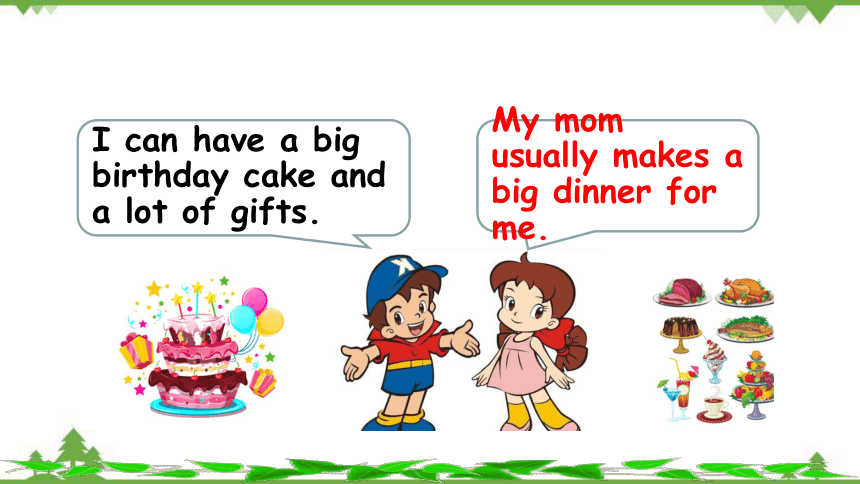
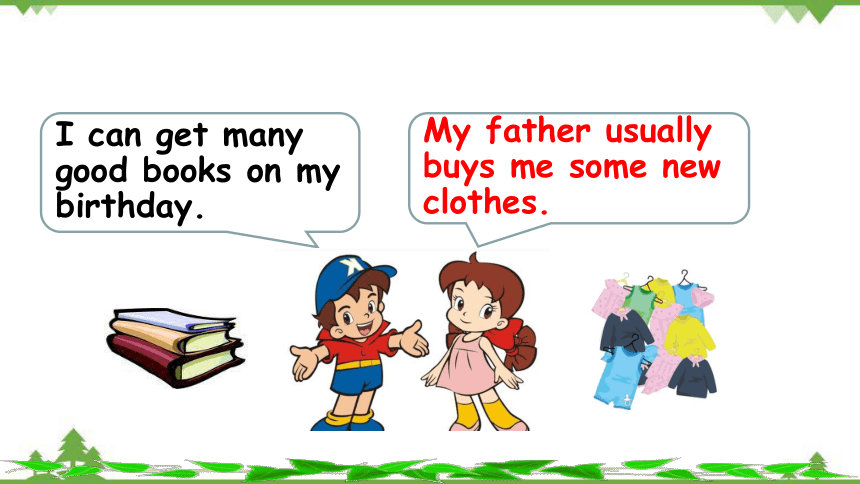
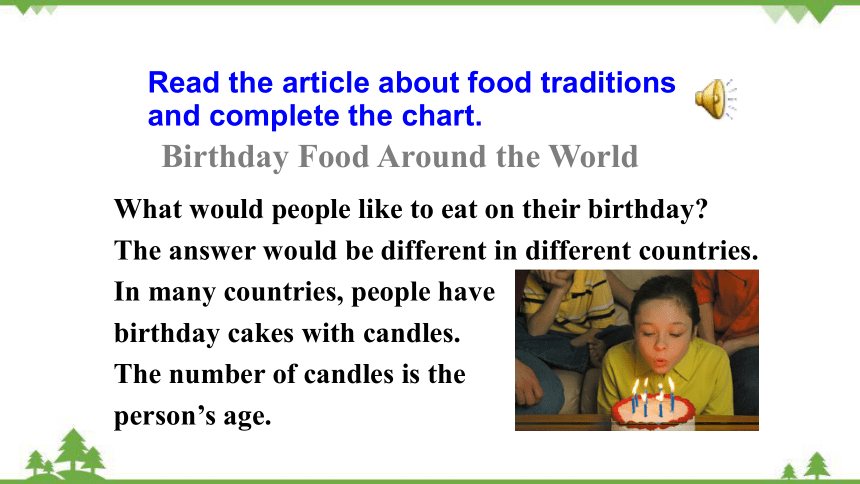
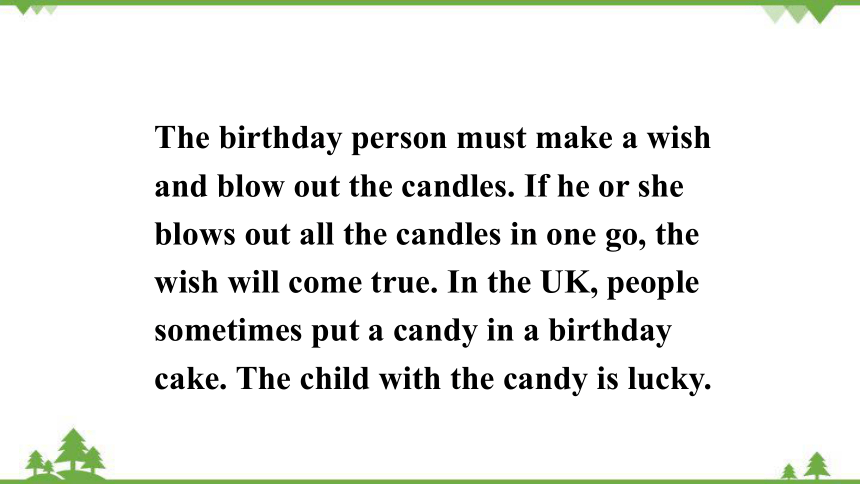
文档简介
(共30张PPT)
Unit 10
I’d like some noodles.
人教版七年级英语下册
Section B 2a-2c
Objectives
To learn the different food traditions all over the world.
To learn to talk about what people would like to eat on their birthday.
Discuss the questions with your partner.
What do you do or eat on your
birthday
2. What do people in other countries
eat on their birthday
2a
I usually have a birthday party.
My friends come to my party. We have a great time.
I usually make a wish and blow out the candles.
I usually eat noodles and eggs for breakfast.
My mom usually makes a big dinner for me.
I can have a big birthday cake and a lot of gifts.
I can get many good books on my birthday.
My father usually buys me some new clothes.
Read the article about food traditions
and complete the chart.
Birthday Food Around the World
What would people like to eat on their birthday
The answer would be different in different countries.
In many countries, people have
birthday cakes with candles.
The number of candles is the
person’s age.
2b
The birthday person must make a wish and blow out the candles. If he or she blows out all the candles in one go, the wish will come true. In the UK, people sometimes put a candy in a birthday cake. The child with the candy is lucky.
In China, it is getting popular to have cake
on your birthday. But many people still eat very long noodles for their birthday. They never cut up the noodles because the long noodles are a symbol of long life. In some places, Chinese people also eat eggs on their birthday. They are a symbol of life and good luck.
All of these birthday foods may be different, but
the ideas are the same. They bring good luck to
the birthday person.
Country Food Special meaning
UK
China
birthday cake
long noodles,
eggs
Blowing out candles on a cake
makes a wish come true.
It is lucky to find a candy in a cake.
Long noodles mean long life.
Eggs mean life and good luck.
Read the article and answer the questions.
1. How can a person make his or her birthday
wish come true
_______________________________________
_______________________________________
2.What do people in the UK sometimes put in
a birthday cake
______________________________________
He or she can blow out all of the
birthday candles in one blow.
They put a candy in a birthday cake.
2c
3. Why do people never cut up birthday
noodles in China
__________________________________
4. Why do people eat special foods on their
birthday
___________________________________
Because long noodles mean long life.
They eat special foods for good luck.
1. around the world 意为“世界各地”。
e.g. He would like to take a trip around
the world.
他想环游世界。
Language points
2. The answer would be different in different countries.
不同国家,答案也不相同。
different 是形容词,意为“不同的”。
e.g. They’re in different classes.
他们在不同的班级。
【拓展】
differently 是副词,意为“不同地”。
e.g. They think differently. 他们的想法不同。
3. The number of the candles is the
person’s age.
蜡烛的数量是这个人的岁数。
the number of 意为“……的数目”,当其作
主语时,谓语动词应用单数形式。
e.g. The number of the students in our class is
forty.
我们班里学生的数目是四十人。
【拓展】
a number of 意为“很多的;大量的”,
后跟可数名词复数形式。
e.g. A number of people are in the park today.
今天有很很多人在公园里。
4. age 意为“年龄”
e.g. What’s his age = How old is he
他多大年龄?
5. If he or she blows out all the candles
in one go, the wish will come true.
如果他(她)一口气把蜡烛全部吹灭的话,许的愿
望便会成真。
1) in one go 相当于汉语中的“同一次”,“一次性地”,其中的介词还可以用at,即at one go。
e.g. You can’t do the work all in one go.
你不可能一次把工作都干完。
2) come true 表示愿望、梦想等的“实现”或
“成为现实”。
e.g. Make a wish, and it can really come true.
许个愿,它一定会实现的。
Keep on working and your dream
will come true.
不断干下去,你的梦想会实现的。
6. The child with the candy is lucky.
得到糖的小孩是幸运的。
lucky 形容词, 意为“幸运的”;而
luck 是名词,意为“运气”。
e.g. She’s really a lucky girl.
她真是一个幸运的女孩。
Eggs are a symbol of life and good luck.
鸡蛋是生命和好运的象征。
Ⅰ.单项选择。
1. --Would you like some more
-- _____. I’m full.
A. Yes, please B. I’d love to
C. No, I would not D. No, thanks
2.There are few____in the fridge. Let’s go
and buy some peas, carrots and cabbages.
A. vegetables B. fruit C. meat D. eggs
Exercises
3. -- I don’t like mutton _____ beef.
-- I don’t like mutton, _____ I like beef a lot.
A. and; but B. and; and
C. or; but D. or; and
4. Some chicken _____ in the bowl. And some
eggs ______ on the table.
A. is; is B. are; are C. is; are D. are; is
5. --Is that apple large --_________.
A. Yes. It’s. B. No, it’s small apple.
C. No, it isn’t. D. No, that’s a small.
6. I’d like some _____ and _____.
A. porridge; vegetable
B. broccolis; tomatoes
C. potatoes; bananas
D. French fries; orange juices
7. Andrew usually has fruit ______ dinner.
A. of B. for C. at D. with
8. -- _____ of shoes do you wear
-- Size 7.
A. What B. What size
C. What kind D. What color
9. The oranges in the store are good
______ cheap.
A. as B. or C. with D. as well as
10. --Would you like some tea --_______.
A. Yes, please. B. No, please.
C. No, I do. D. Yes, I wouldn’t
Ⅱ.句型转换。
1. kind, what, they, like, of, would, noodles
(连词成句)
___________________________________
2. She has a strawberry. (用they替换she)
They ______ some _____________.
3. Nancy wants some salad. (同义句转换)
Nancy _______ ____ some salad.
What kind of noodles would they like
have
strawberries
would like
4. He’d like a medium bowl.
(改为一般疑问句)
_______ _____ like a medium bowl
5. My phone number is 62885151.
(对划线部分提问)
_______ ______ phone number
6. I’d like a cup of tea.(就划线部分提问)
What ________ you ______
Would he
What’s your
would
like
— We will go for a picnic if it ______ this Sunday.
— Sounds great.
A. won't rain
B. is sunny
C. will be sunny
中考链接
【2019·湖南湘西】
B
Make a survey. Ask what your class
eat on birthday and write a passage.
2. Write the words and expressions
in Section B.
Unit 10
I’d like some noodles.
人教版七年级英语下册
Section B 2a-2c
Objectives
To learn the different food traditions all over the world.
To learn to talk about what people would like to eat on their birthday.
Discuss the questions with your partner.
What do you do or eat on your
birthday
2. What do people in other countries
eat on their birthday
2a
I usually have a birthday party.
My friends come to my party. We have a great time.
I usually make a wish and blow out the candles.
I usually eat noodles and eggs for breakfast.
My mom usually makes a big dinner for me.
I can have a big birthday cake and a lot of gifts.
I can get many good books on my birthday.
My father usually buys me some new clothes.
Read the article about food traditions
and complete the chart.
Birthday Food Around the World
What would people like to eat on their birthday
The answer would be different in different countries.
In many countries, people have
birthday cakes with candles.
The number of candles is the
person’s age.
2b
The birthday person must make a wish and blow out the candles. If he or she blows out all the candles in one go, the wish will come true. In the UK, people sometimes put a candy in a birthday cake. The child with the candy is lucky.
In China, it is getting popular to have cake
on your birthday. But many people still eat very long noodles for their birthday. They never cut up the noodles because the long noodles are a symbol of long life. In some places, Chinese people also eat eggs on their birthday. They are a symbol of life and good luck.
All of these birthday foods may be different, but
the ideas are the same. They bring good luck to
the birthday person.
Country Food Special meaning
UK
China
birthday cake
long noodles,
eggs
Blowing out candles on a cake
makes a wish come true.
It is lucky to find a candy in a cake.
Long noodles mean long life.
Eggs mean life and good luck.
Read the article and answer the questions.
1. How can a person make his or her birthday
wish come true
_______________________________________
_______________________________________
2.What do people in the UK sometimes put in
a birthday cake
______________________________________
He or she can blow out all of the
birthday candles in one blow.
They put a candy in a birthday cake.
2c
3. Why do people never cut up birthday
noodles in China
__________________________________
4. Why do people eat special foods on their
birthday
___________________________________
Because long noodles mean long life.
They eat special foods for good luck.
1. around the world 意为“世界各地”。
e.g. He would like to take a trip around
the world.
他想环游世界。
Language points
2. The answer would be different in different countries.
不同国家,答案也不相同。
different 是形容词,意为“不同的”。
e.g. They’re in different classes.
他们在不同的班级。
【拓展】
differently 是副词,意为“不同地”。
e.g. They think differently. 他们的想法不同。
3. The number of the candles is the
person’s age.
蜡烛的数量是这个人的岁数。
the number of 意为“……的数目”,当其作
主语时,谓语动词应用单数形式。
e.g. The number of the students in our class is
forty.
我们班里学生的数目是四十人。
【拓展】
a number of 意为“很多的;大量的”,
后跟可数名词复数形式。
e.g. A number of people are in the park today.
今天有很很多人在公园里。
4. age 意为“年龄”
e.g. What’s his age = How old is he
他多大年龄?
5. If he or she blows out all the candles
in one go, the wish will come true.
如果他(她)一口气把蜡烛全部吹灭的话,许的愿
望便会成真。
1) in one go 相当于汉语中的“同一次”,“一次性地”,其中的介词还可以用at,即at one go。
e.g. You can’t do the work all in one go.
你不可能一次把工作都干完。
2) come true 表示愿望、梦想等的“实现”或
“成为现实”。
e.g. Make a wish, and it can really come true.
许个愿,它一定会实现的。
Keep on working and your dream
will come true.
不断干下去,你的梦想会实现的。
6. The child with the candy is lucky.
得到糖的小孩是幸运的。
lucky 形容词, 意为“幸运的”;而
luck 是名词,意为“运气”。
e.g. She’s really a lucky girl.
她真是一个幸运的女孩。
Eggs are a symbol of life and good luck.
鸡蛋是生命和好运的象征。
Ⅰ.单项选择。
1. --Would you like some more
-- _____. I’m full.
A. Yes, please B. I’d love to
C. No, I would not D. No, thanks
2.There are few____in the fridge. Let’s go
and buy some peas, carrots and cabbages.
A. vegetables B. fruit C. meat D. eggs
Exercises
3. -- I don’t like mutton _____ beef.
-- I don’t like mutton, _____ I like beef a lot.
A. and; but B. and; and
C. or; but D. or; and
4. Some chicken _____ in the bowl. And some
eggs ______ on the table.
A. is; is B. are; are C. is; are D. are; is
5. --Is that apple large --_________.
A. Yes. It’s. B. No, it’s small apple.
C. No, it isn’t. D. No, that’s a small.
6. I’d like some _____ and _____.
A. porridge; vegetable
B. broccolis; tomatoes
C. potatoes; bananas
D. French fries; orange juices
7. Andrew usually has fruit ______ dinner.
A. of B. for C. at D. with
8. -- _____ of shoes do you wear
-- Size 7.
A. What B. What size
C. What kind D. What color
9. The oranges in the store are good
______ cheap.
A. as B. or C. with D. as well as
10. --Would you like some tea --_______.
A. Yes, please. B. No, please.
C. No, I do. D. Yes, I wouldn’t
Ⅱ.句型转换。
1. kind, what, they, like, of, would, noodles
(连词成句)
___________________________________
2. She has a strawberry. (用they替换she)
They ______ some _____________.
3. Nancy wants some salad. (同义句转换)
Nancy _______ ____ some salad.
What kind of noodles would they like
have
strawberries
would like
4. He’d like a medium bowl.
(改为一般疑问句)
_______ _____ like a medium bowl
5. My phone number is 62885151.
(对划线部分提问)
_______ ______ phone number
6. I’d like a cup of tea.(就划线部分提问)
What ________ you ______
Would he
What’s your
would
like
— We will go for a picnic if it ______ this Sunday.
— Sounds great.
A. won't rain
B. is sunny
C. will be sunny
中考链接
【2019·湖南湘西】
B
Make a survey. Ask what your class
eat on birthday and write a passage.
2. Write the words and expressions
in Section B.
同课章节目录
- Unit 1 Can you play the guitar?
- Section A
- Section B
- Unit 2 What time do you go to school?
- Section A
- Section B
- Unit 3 How do you get to school?
- Section A
- Section B
- Unit 4 Don't eat in class.
- Section A
- Section B
- Unit 5 Why do you like pandas?
- Section A
- Section B
- Unit 6 I'm watching TV.
- Section A
- Section B
- Review of Units 1-6
- Unit 7 It's raining!
- Section A
- Section B
- Unit 8 Is there a post office near here?
- Section A
- Section B
- Unit 9 What does he look like?
- Section A
- Section B
- Unit 10 I'd like some noodles.
- Section A
- Section B
- Unit 11 How was your school trip?
- Section A
- Section B
- Unit 12 What did you do last weekend?
- Section A
- Section B
